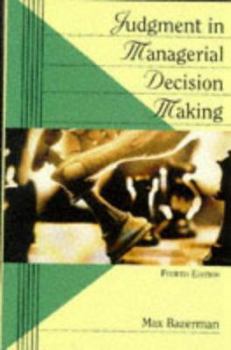Judgment Managerial Decision Making
Select Format
Select Condition 
Book Overview
Decision making plays a crucial role in managerial life. But too often, our decisions are clouded by personal biases and uncertainty. This brief book shows readers how to identify their own biases in order to make better decisions. Experimental in approach, the book teaches decision making by involving the reader in decision quizzes.
Format:Paperback
Language:English
ISBN:0471178071
ISBN13:9780471178071
Release Date:July 1997
Publisher:Wiley
Length:208 Pages
Weight:0.70 lbs.
Dimensions:0.4" x 6.2" x 9.3"
Customer Reviews
5 ratings
Useful guide on how to make sound, smart decisions
Published by Thriftbooks.com User , 15 years ago
Consider this scenario: Two groups are playing basketball. One group wears black, the other white. Researchers film each group separately passing a basketball back and forth, and superimpose the two films on a television monitor. They ask research participants to add up the number of passes the players make. Because the separate images of basketballs flying here and there overlap, the counters must pay close attention. Under such circumstances, how many of the observers would fail to see a man dressed as a gorilla stroll through the basketball court while dramatically thumping his chest? Believe it or not, eight out of ten. Scientists call this "inattentional blindness." Distinguished Harvard professor Max H. Bazerman refers to such tests as he explains the concept of "bounded awareness." When people fail to notice information, their lack of perception may preclude them from making sound decisions. Bazerman fills his book with learned insights, fascinating research and intriguing tests. He exposes the mental biases, skewed logic, false premises and misleading emotions that interfere with good decision making. getAbstract recommends this tantalizing book to those who want to understand the nuts-and-bolts of the thinking process, and to enhance their decision-making prowess.
We're not so smart
Published by Thriftbooks.com User , 17 years ago
Have you ever wondered why some people make such stupid mistakes? Well, we are all prone, hard-wired and influenced to make astounding errors in judgment. Bazerman takes you on a journey into all the reasons why, full substantiated by science. All of it is fascinating. And, hopefully, once you are aware of what is really going on in our own brains we can be aware enough to mitigate those dangerous tendencies and become very clear about what we do.
Master Judgment for Managment and Life
Published by Thriftbooks.com User , 17 years ago
A very well written book that will lead you to the most rigorous introspection in decision making
Summary - Judgment In Managerial Decision Making
Published by Thriftbooks.com User , 27 years ago
Max Bazerman had one central purpose in mind when he wrote his book, Judgment In Managerial Decision Making. He hoped to improve the judgment and decision making skills of his audience, whether they be managers of multi-billion dollar corporations or consumers deciding how much to offer a salesman for a new car. Through the use of vivid real-world examples Max Bazerman identifies systematic ways in which judgment and decision making skills deviate from rationality under uncertain conditions. The end result is that the reader can readily comprehend the concepts outlined in the book and easily apply them to his or her own life. The only major weakness in the book has to do with its discussion of the multiparty decision-making process. Because of the complex dynamics of these multiparty situations, Bazerman is forced to limit his coverage to only a select number of issues that he believes are especially pertinent to understanding decision making among several groups. Academics have also spent less formal research time on multiparty decision-making versus two-party and individual decision making. Therefore, the number of real-world contemporary examples are quite limited, making the reader less inclined to believe the results.
Makes you think about your own decision making process.
Published by Thriftbooks.com User , 27 years ago
In his book, Judgment in Managerial Decision Making, Max Bazerman applies behavioral decision research into an organizational setting. He acknowledges that even though the rational decision-making process will lead to optimal decisions, the process is too time consuming to use in reality. Therefore, managers must rely on their intuitive judgment to find satisficing solutions to the problems they confront on a daily basis. The first half of the book examines the reader's judgment by explaining how the utilization of heuristics, rules of thumb used by managers to simplify problem solving in complex situations, can lead to irrational decisions when inappropriately applied. Cognitive biases are the cause of irrational decisions when heuristics are used improperly. In addition, Bazerman also offers an analysis of how uncertainty, escalation of commitment, and concern for fairness affect managerial decision-making. The second half of the book addresses how the decision-making process relates to both two-party and multiparty situations. Bazerman discusses the difficulty individuals face when trying to act rationally in competitive negotiations. He also describes the complexities work groups or project teams face when they hold a cooperative as well as a competitive position. The final chapter presents four strategies for improving the decision-making process. The first and second strategies are eliminating biases, and acquiring experience and expertise through feedback on the outcome of previous decisions. Both strategies are designed to alter intuitive responses to various decision-making situations. The third and fourth strategies offer techniques for improving decisions using linear models and accounting for the biases that influence the decisions of others. In his conclusions, Bazerman states that "the manager is likely rewarding behaviors that may not be functional in the future" by rewarding results rather than the decision-making process. Therefore, he recommends that managers reward employees for good decisions rather than results. Improving judgment and decision-making abilities is a step in the right direction towards making better decisions.






